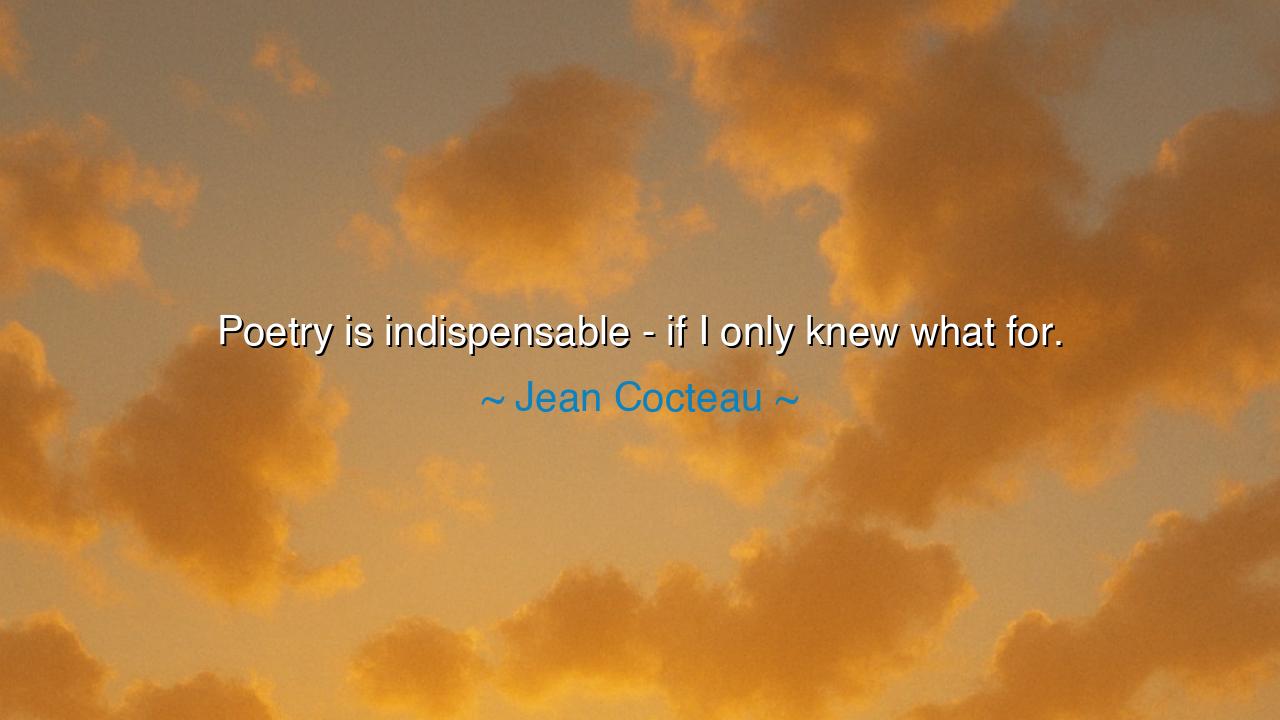
Poetry is indispensable - if I only knew what for.






"Poetry is indispensable—if I only knew what for." Thus spoke Jean Cocteau, the visionary poet and dramatist of France, whose life was steeped in the strange marriage of mystery and clarity. In these words, he gives voice to a paradox that has haunted humanity since the dawn of song: that poetry is essential to life, yet its purpose forever eludes precise definition. It is like air—we breathe it, we need it, yet we rarely stop to ask what it is for. Cocteau admits what all wise souls know: poetry cannot be caged in reason, for it lives in the heart, in the trembling of the skin, in the silence between words.
The ancients knew this paradox well. When Homer sang of Achilles’ rage or Odysseus’ long return, he was not crafting instruction manuals for war or travel. His poetry gave no clear “use” in the manner of tools, yet without it, Greece would have been poorer, robbed of its soul. For what is a civilization that cannot sing its victories, weep for its losses, or dream beyond the dust of labor? Cocteau reminds us that even if we cannot answer the question “what for,” we know instinctively that without poetry, something vital in us withers.
Consider the soldiers of the First World War. Amid the mud, the blood, the endless slaughter, men turned not to strategy for comfort, but to poetry. Wilfred Owen wrote of pity, of horror, of broken bodies and broken dreams. His verses did not heal the wounds of flesh, but they spoke to the wounds of the spirit. In trenches where death reigned, poetry gave voice to what otherwise could not be spoken. It was indispensable, though no soldier could say exactly "what for"—except that without it, the soul would drown in silence.
Poetry, then, is not a tool, but a flame. It lights the darkness of existence, not by explaining, but by revealing. It reminds us that we are not only creatures of bread and stone, but also of longing and wonder. To ask “what for” is to demand that a star justify its shining. Yet the star answers simply by burning. So it is with poetry: it exists, and in its existence, we are kept human.
And yet, we must not mistake Cocteau’s confession for ignorance. His irony is wisdom. He shows us that poetry resists utility. It is not made to build walls or sharpen blades, but to lift the spirit beyond them. When we say it is indispensable, we mean that even though we cannot define its purpose, we know our lives collapse without it. Remove poetry from the world, and the temples of the heart stand empty, the laughter of children grows thin, and the courage to endure hardship fades away.
So what lesson must we draw? That though we may not define the use of poetry, we must embrace it. We must read it, write it, speak it, and carry it in our memory. We must let it speak when reason falters, let it rise in moments of grief, let it strengthen us in times of despair. It is not for us to cage its meaning, but to live within its mystery.
Therefore, O children of tomorrow, do not neglect the poet’s gift. Do not ask only, “What is it for?” Ask instead, “How does it move me? What does it awaken in my soul?” Let poetry guide you—not as a map with roads, but as a star with light. For in its light you will find courage, tenderness, and the remembrance that you are not only flesh, but spirit. And when you pass from this world, it may be a single line of verse that remains, bearing your memory into eternity.






AAdministratorAdministrator
Welcome, honored guests. Please leave a comment, we will respond soon